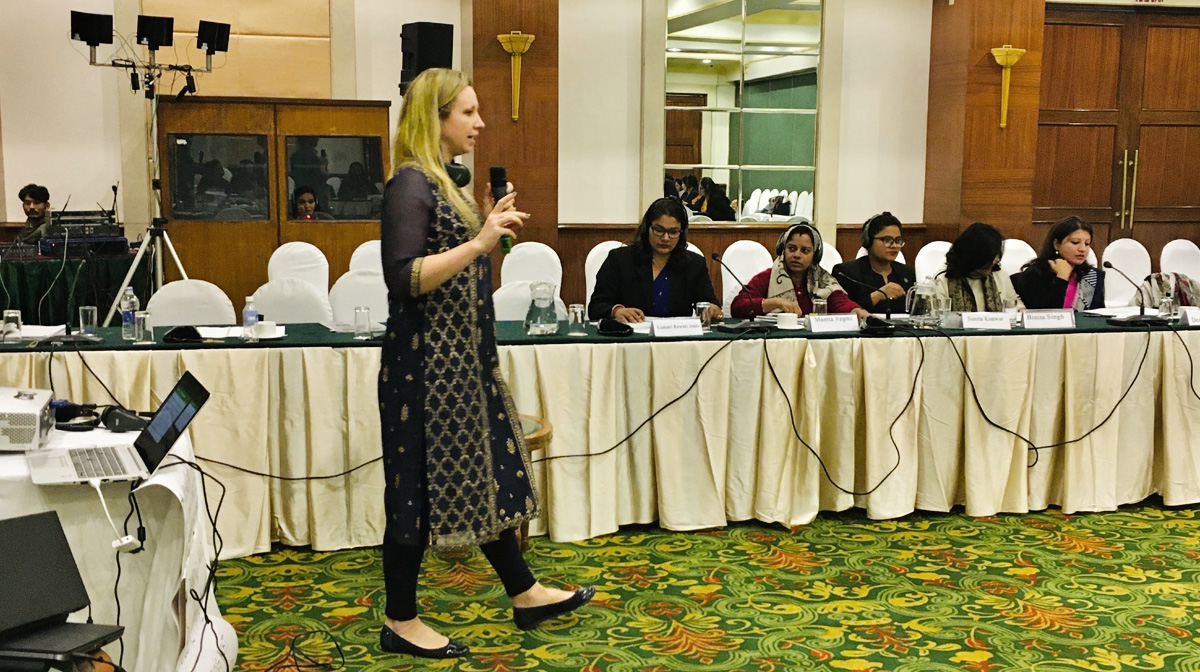Helping Women Lawyers in the Himalayas

I had the window seat on the final leg of my flight to Kathmandu, Nepal. As the plane approached, I peered out the window to see if I could catch a good photo as we flew over the Himalayas. It took me a few seconds of scanning the Earth before I shifted my gaze to look upwards. Stretching up over 7000m above sea level, the peaks were already overhead as we descended into the Kathmandu valley.
This was my first time in Nepal and I was there as part of a week-long training for women lawyers organized by DLA Piper’s New Perimeter in partnership with the Canadian NGO Women Lawyers Joining Hands (WLJH) and the Nepal Bar Association. This was the fifth time this training was organized and included two tracks: an “advanced” track for lawyers who participated in the training last year and a “basic” track for new participants. Notably, this was the first year that the programme included women lawyers from every province in Nepal. Just as I was completing my 24-hour trip from New York City to Kathmandu, many of the participants were making a similar trek by bus for just as long if not longer from some of the remote and most isolated parts of the country.
This is significant because Nepal remains a poor country, with women often having fewer educational and professional opportunities. Those living in rural or isolated communities face additional challenges and obstacles. On the first day of training, I facilitated a session with the “basic” track and, with the help of our outstanding real-time interpreters, got to know the participants, nearly all of whom came from outside Kathmandu. A few defining features of being a woman lawyer in Nepal quickly emerged. First, many women lawyers do not get paid their first few years of practice. Second, most of the women were married and all but one had children. This means that to study law, develop their skills and build their practice, women need to take time away from their familial obligations and yet are often unable to contribute financially for some time. Because of this there are very few women lawyers in Nepal (particularly in rural communities).
In this regard, the value of the training programme became crystal clear and explained why these women would leave their families and travel 24 hours through the mountains by bus to spend a week with us talking about the law. The programme offered the opportunity for concrete skill development alongside community building. We focused on black letter law such as intellectual property and corporate law as well as legal practice skills such as client interviewing, negotiation, and advocacy. Perhaps more importantly, we facilitated sessions focused on the practical side of being a lawyer. No joke - one of the most lively discussions was about drafting client retainer agreements. Moreover, the participants developed a new social network of dozens of women throughout Nepal and indeed the world – these friendships crystallized with (literally…) hundreds of selfies.
As I left Nepal, I was focused on a fundamental ideal just as lofty as those Himalayan peaks: the practice of law is, and always has been, a mentorship profession. It simply cannot exist with lawyers operating in isolation. This is true throughout the world, regardless of jurisdiction. The fact that every year the Nepal Bar Association, WLJH and New Perimeter devote significant time and resources to bring together advocates from Canada, the US, Australia, Europe, Asia, and throughout Nepal to foster this mentorship, demonstrates an astounding commitment to our shared profession and our collective continuing education. It was truly an honor to join this team in Nepal and to learn from my fellow trainers and fellow women lawyers.
Enhancing the Skills of Women Lawyers in Nepal
